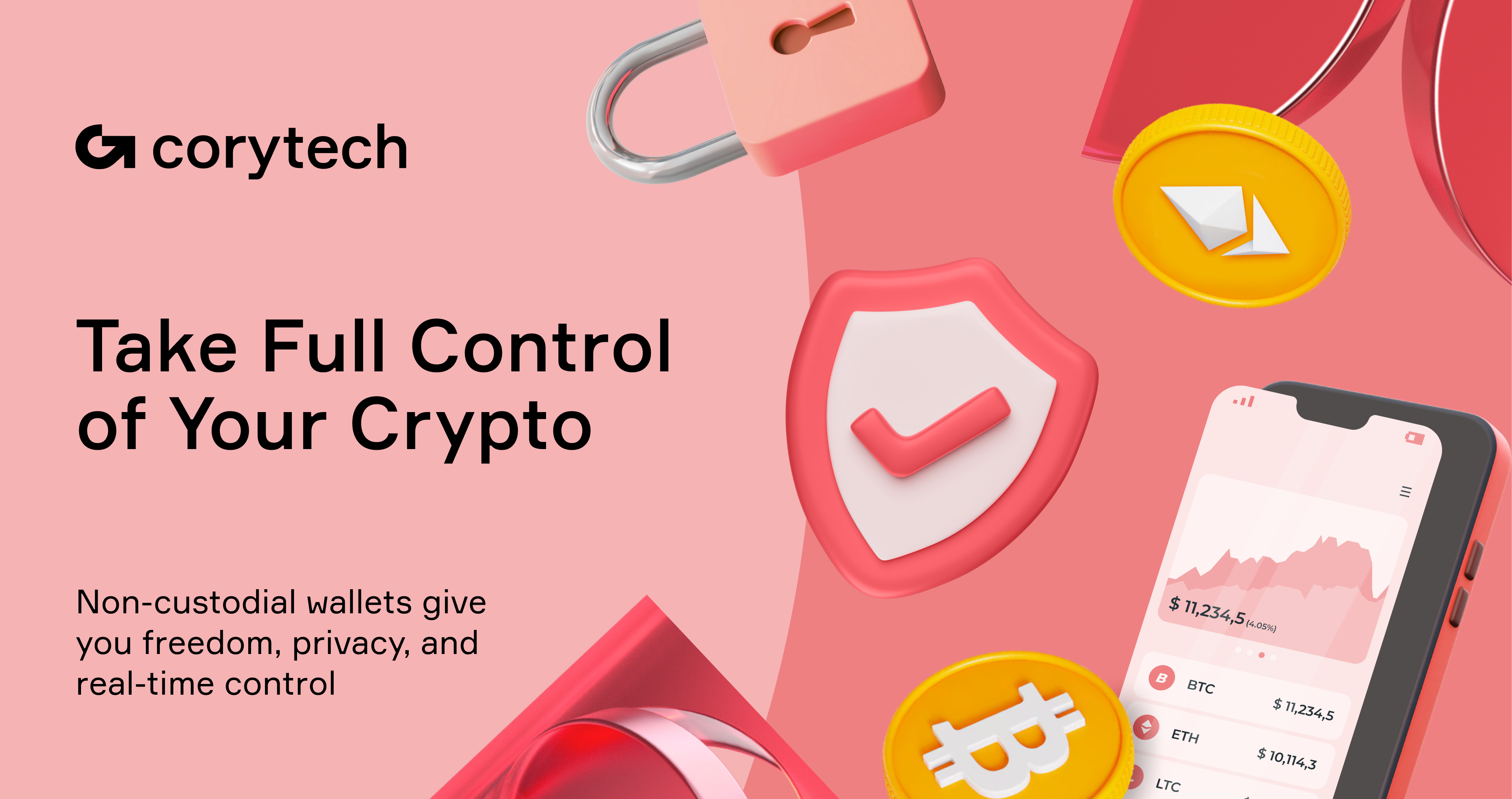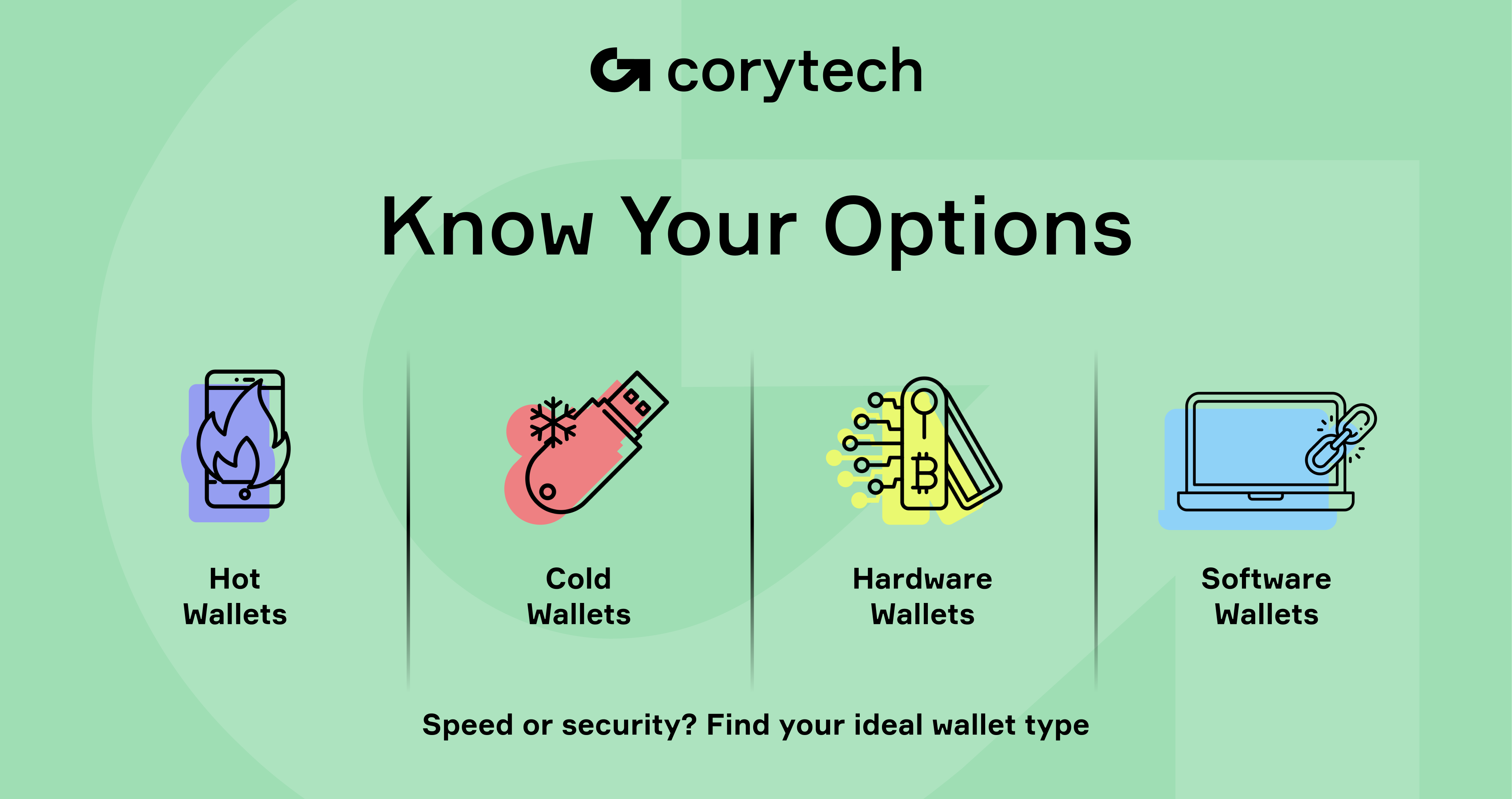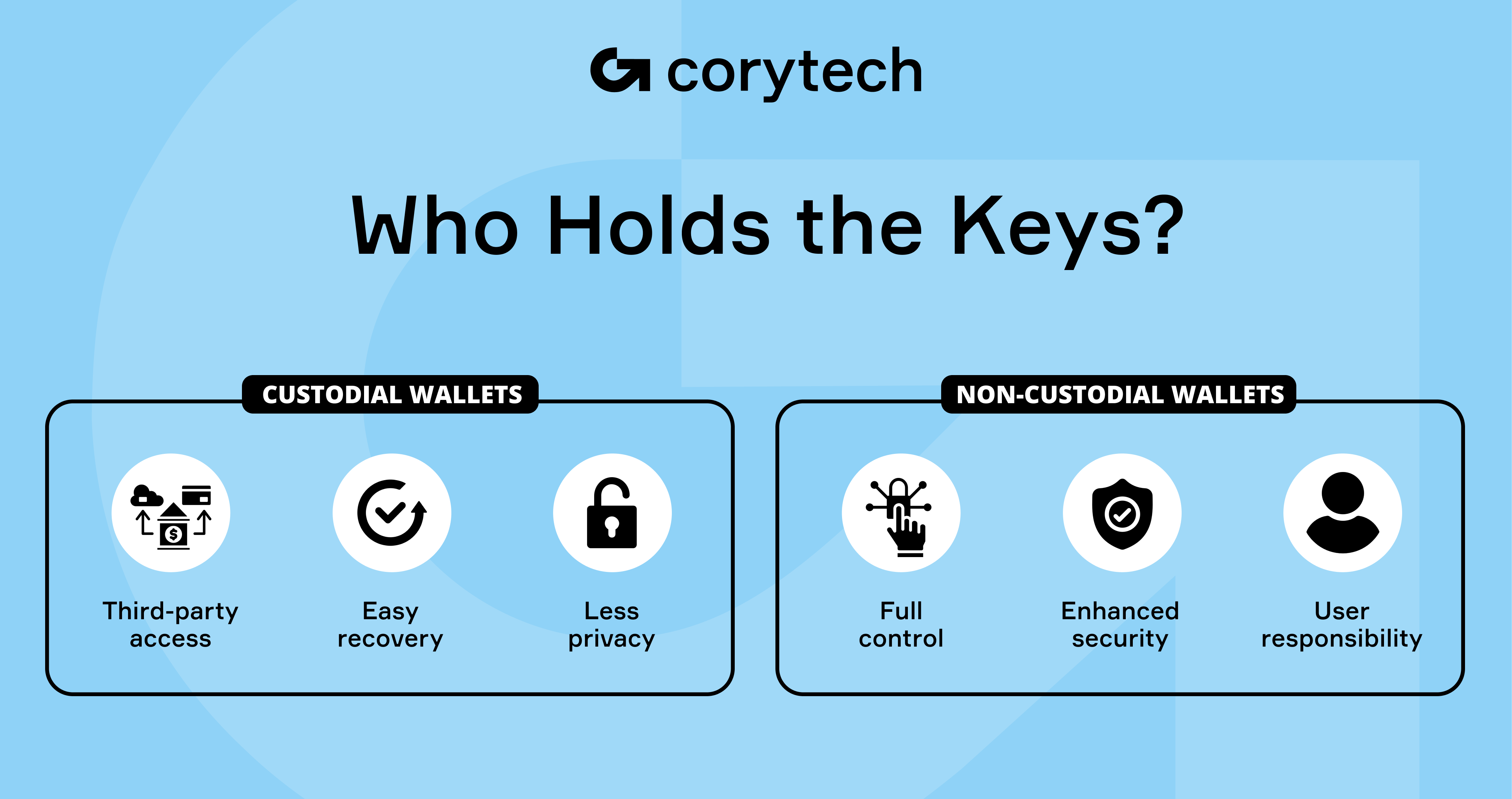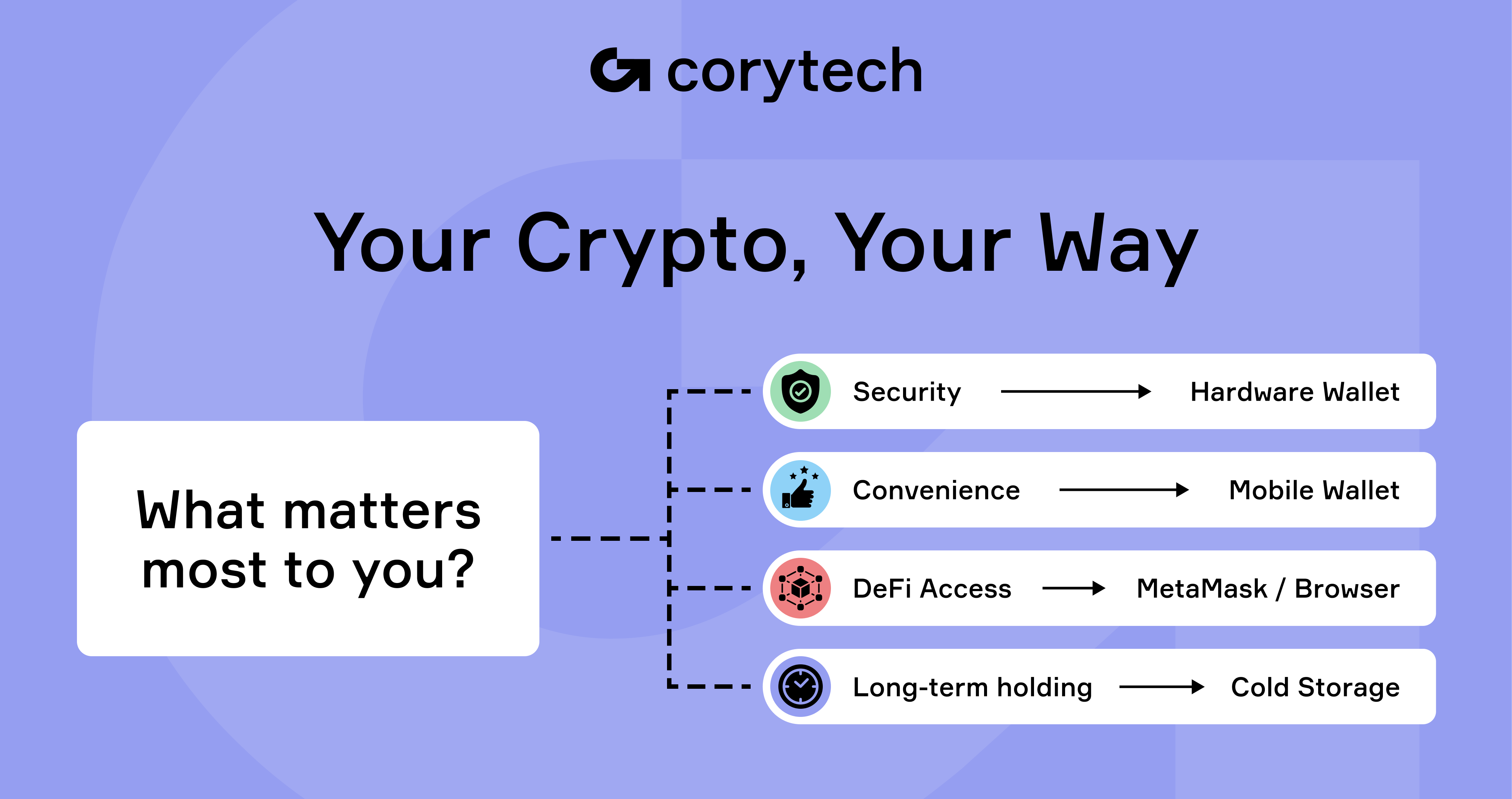Crypto wallets are essential tools in the world of digital assets, acting as software programs that store private and public keys. These keys are crucial for sending and receiving various cryptocurrencies, as well as monitoring your balance. Known as crypto wallets or cryptocurrency wallets, they play a vital role in securing your digital assets. With the rise of cryptocurrencies, the demand for secure and reliable crypto wallets has surged, leading to the development of different types of wallets, including non-custodial and custodial wallets. Non-custodial crypto wallets, in particular, have gained popularity due to their ability to provide users with complete control over their crypto assets.
Understanding Custodial Wallets
Custodial wallets are a type of wallet where the private keys are held by a third party, giving them control over the funds. In a custodial wallet, users do not have full control over their funds, as the third party is responsible for managing the private keys. These wallets are also known as centralized wallets and are often provided by crypto exchanges. While custodial wallets can be convenient, they come with risks, such as the potential for hacking and theft. In contrast, non-custodial wallets, like the Trust Wallet and Coinbase Wallet, allow users to maintain complete control over their private keys and crypto assets, offering a higher level of security and autonomy.
Benefits of Non-Custodial Wallets
Non-custodial wallets offer a range of benefits that make them an attractive choice for managing crypto assets. One of the primary advantages is user control. With a non-custodial wallet, users have full control over their funds and can manage their crypto assets without relying on a third party. This autonomy ensures that users are solely responsible for their private keys, enhancing security. Additionally, non-custodial wallets allow for instant withdrawals, as users do not need to wait for confirmation from a third party. This immediacy is particularly beneficial for those who need quick access to their funds.

Types of Non-Custodial Wallets
Non-custodial wallets come in various forms, offering different levels of security, convenience, and accessibility. Below are the main types:
1. Hot Wallets
Hot wallets are connected to the internet, making them easy to use for frequent transactions. However, they are more vulnerable to online attacks.
- Examples: MetaMask, Trust Wallet, Exodus Wallet.
- Pros: Quick access, supports many cryptocurrencies.
- Cons: Less secure due to internet connectivity.
2. Cold Wallets
Cold wallets are offline storage solutions, offering maximum security by being disconnected from the internet. They are ideal for long-term storage.
- Examples: Ledger Nano X, Trezor Model T, KeepKey.
- Pros: High security, ideal for long-term storage.
- Cons: Less convenient for regular transactions.
3. Software Wallets
Software wallets are applications installed on computers or mobile devices. They offer control over private keys but are vulnerable to malware if the device is compromised. These wallets are compatible with various platforms, including both Android and desktop versions, ensuring accessibility and versatility.
- Examples: Electrum, Armory, Jaxx Liberty.
- Pros: Easy installation, accessible on mobile and desktop.
- Cons: Vulnerable to hacking if the device is compromised.
4. Hardware Wallets
Hardware wallets are physical devices that store private keys offline, providing the highest security for long-term storage.
- Examples: Ledger Nano S, Trezor One, BitBox02.
- Pros: Ultimate security, offline storage.
- Cons: Higher cost, requires physical device for access.
These features make non-custodial wallets a reliable choice for those who want to maintain control over their digital assets while ensuring security. Transactions from non-custodial wallets are reflected on the blockchain in real-time, providing users with immediate confirmation and transparency. Additionally, non-custodial wallets offer instant withdrawals without requiring third-party confirmation, further enhancing their efficiency and user control.

Key Features of Non-Custodial Wallets
Non-custodial wallets offer several important features that prioritize security, privacy, and user control. Below are some key aspects that make them stand out:
- Private Key Management
Non-custodial wallets give users full control over their private keys, which are essential for accessing and managing their cryptocurrency. This means that only the user, not a third party, has access to their funds, ensuring greater security and privacy.
- Encryption
Many non-custodial wallets use strong encryption to protect user data, including transaction information and wallet backups. This ensures that even if a user's device is compromised, their data remains secure and inaccessible without the correct decryption key.
- Two-Factor Authentication (2FA)
Two-factor authentication adds an extra layer of security by requiring users to verify their identity with a second factor (such as a code sent to their phone) in addition to their password. This reduces the risk of unauthorized access to the wallet and assets.
- Multi-Signature Verification
Multi-signature wallets require multiple signatures to authorize transactions, providing an additional level of security. This feature is especially useful for businesses or joint accounts, as it ensures that no single user can access funds or make transactions without the approval of others.
These features make non-custodial wallets a reliable choice for those who want to maintain control over their digital assets while ensuring security.
User Experience
Non-custodial wallets are designed with ease of use in mind, offering features that enhance the overall user experience:
- User-Friendly Interface
Many non-custodial wallets offer intuitive interfaces that simplify complex features, making it easier for both beginners and experienced users to manage their cryptocurrencies. The streamlined design ensures that users can access all key functions with minimal hassle.
- Fee Customization
Some wallets allow users to customize transaction fees based on their preferences or the urgency of a transaction. This flexibility ensures that users can optimize their costs, paying higher fees for faster transactions or lower fees for standard processing times.
- Fiat Support
Certain non-custodial wallets support fiat currencies, allowing users to buy, sell, or exchange cryptocurrencies directly with traditional money. This feature provides a bridge between the crypto world and the fiat economy, making it easier for users to engage with both.
- Multi-Lingual Support
To accommodate users from around the globe, some non-custodial wallets offer support for multiple languages. This makes wallets more accessible to a broader audience and enhances user experience for non-English speakers.
Compatibility
Non-custodial wallets are built to be highly compatible, offering features that integrate well with a variety of devices and platforms.
- Cross-Platform Compatibility
Many non-custodial wallets are available on multiple devices and operating systems, including desktop, mobile, and web platforms. This cross-platform compatibility ensures that users can access their wallets from anywhere, anytime, and on any device. Additionally, non-custodial cryptocurrency wallets offer enhanced security and control, allowing users to manage their private keys and maintain full autonomy over their digital assets.
- DApp and DeFi Integration
Some non-custodial wallets integrate seamlessly with decentralized applications (DApps) and decentralized finance (DeFi) platforms. This allows users to interact with the growing ecosystem of decentralized services directly from their wallet, enabling seamless transactions and engagement with DeFi protocols.
- Cold Storage Support
Certain non-custodial wallets offer cold storage options, allowing users to store their private keys offline for maximum security. This feature is particularly useful for long-term storage of cryptocurrency, providing an added layer of protection against online threats.
These features enhance the functionality and versatility of non-custodial wallets, ensuring that users have a secure, flexible, and convenient experience.
Backup and Recovery Options
Non-custodial wallets often provide robust backup and recovery options to ensure users can regain access to their funds if they lose access to their wallet. Common methods include seed phrases and private key backups. These options are essential for users who want to ensure that they can access their crypto assets at all times. For example, the Ledger Nano and Trezor Wallet offer secure backup and recovery options, giving users peace of mind when storing their crypto assets. By securely storing a seed phrase or private key, users can recover their wallet and funds even if their device is lost or damaged.

Choosing the Right Non-Custodial Wallet
Selecting the right non-custodial wallet depends on several factors that affect both security and ease of use. To make the best choice, consider the following elements:
1. Security Features
Security is the most critical factor when choosing a non-custodial wallet. Given that non-custodial wallets give you control over your private keys, ensuring that these keys are securely stored is vital.
- Private Key Management: Choose wallets that allow you to fully control your private keys. This feature ensures that only you can access your funds. Non-custodial wallets are designed to keep your crypto safe by utilizing strong passwords and two-factor authentication. Take a look at the Deffio wallet here.
- Encryption: Look for wallets with advanced encryption to protect your data. For instance, Ledger Nano X and Trezor Model T offer high-level encryption standards, ensuring your private keys and sensitive information are safe.
- Two-Factor Authentication (2FA): Some wallets, like Trust Wallet and Exodus Wallet, integrate 2FA for an added layer of security, requiring a second form of identification to access the wallet.
- Multi-Signature Support: If you are using your wallet for business or joint accounts, choose a wallet that supports multi-signature transactions. Electrum offers multi-signature features, requiring multiple approvals before executing a transaction.
Fact: According to a 2019 study by the European Central Bank, 45% of all crypto transactions involve security concerns, underlining the importance of strong wallet security.
2. User Experience
A wallet with a user-friendly interface can significantly enhance your experience, especially if you are a beginner in the cryptocurrency space.
- Ease of Use: Opt for wallets that offer a clean, intuitive interface. Exodus is known for its simple yet effective design, making it easy to navigate and access all wallet features. Non-custodial wallets also allow users to gain access to their funds without the need for identity verification, unlike custodial wallets that require KYC.
- Customizable Fees: Some wallets, like Trust Wallet and MetaMask, allow users to adjust transaction fees, offering flexibility to choose higher fees for faster transactions or lower fees for standard processing.
- Fiat Support: If you plan to use fiat currencies alongside cryptocurrencies, wallets like Trust Wallet and Coinomi support buying and selling crypto with traditional currencies, providing a seamless transition between the two economies.
- Multi-Language Support: If you are a non-English speaker, choose wallets like Jaxx Liberty or Coinomi, which offer support for multiple languages.
Fact: A 2021 survey by Statista found that 37% of cryptocurrency users consider the ease of use a critical factor when choosing a wallet.
3. Compatibility
Ensure that the wallet you choose supports the cryptocurrencies and blockchains you plan to use, as compatibility is essential for flexibility and accessibility.
- Cross-Platform Compatibility: Many non-custodial wallets, such as MetaMask and Exodus, offer apps for both desktop and mobile devices, ensuring you can access your wallet from any device. There are multiple types of non-custodial wallets available to meet different needs, such as long-term safekeeping and active trading.
- DApp and DeFi Integration: If you’re interested in decentralized finance (DeFi) or interacting with decentralized applications (DApps), MetaMask and Trust Wallet offer seamless integration with Ethereum-based DApps and DeFi platforms.
- Cold Storage Support: For those prioritizing security, wallets like Ledger Nano X and Trezor Model T offer offline storage (cold storage) for maximum protection against hacking attempts.
- Built-in Swapping and Staking: Atomic Wallet supports thousands of crypto assets and includes built-in swapping and staking modules, adding utility for users.
Fact: CoinMarketCap reports that over 45% of global cryptocurrency users prefer wallets that support cross-chain compatibility, highlighting the importance of choosing wallets that integrate with multiple blockchains.
How to Compare Wallets
- Security: Look for robust encryption, 2FA, and multi-signature support.
- User Interface: Prioritize wallets that are easy to navigate and customize.
- Cryptocurrency Compatibility: Make sure the wallet supports the cryptocurrencies you plan to use. Exodus Wallet, for example, supports over 100 cryptocurrencies.
- Cost: While most wallets are free, hardware wallets like Ledger Nano X and Trezor Model T come at a cost but offer higher security for long-term storage. Multi-currency wallets provide a consolidated view of all investments, which enhances tracking and management, making them a practical choice for users with diverse portfolios.
Integration Possibilities and Add-on Services
Non-custodial wallets can integrate with other wallets and services, such as hardware wallets and decentralized applications, to provide users with a range of add-on services. These services can include staking, lending, and trading, helping users to maximize the utility of their crypto assets. For instance, the Atomic Wallet and Exodus Wallet offer integration with popular decentralized applications, allowing users to access a variety of services and features. Additionally, non-custodial wallets can provide access to multiple blockchains, enabling users to store and manage a diverse range of crypto assets. This versatility makes non-custodial wallets a powerful tool for anyone looking to engage deeply with the crypto ecosystem.
When choosing a non-custodial wallet, it's essential to strike a balance between security, user experience, and compatibility. Whether you're a beginner or an experienced cryptocurrency user, finding a wallet that suits your needs and preferences will ensure that you can manage your assets securely and efficiently. By considering these factors, you'll be equipped to make an informed decision about the best non-custodial wallet for your cryptocurrency needs.
Top Non-Custodial Wallets for 2025
1. Ledger
Ledger is a leading hardware wallet that supports over 5,500 cryptocurrencies, including Bitcoin, Ethereum, and many altcoins. Known for its top-tier security, the Ledger Nano X offers Bluetooth connectivity for mobile use, while the Ledger Nano S remains a more affordable, compact option for secure storage. Users can also instantly exchange the supported assets within the wallet, showcasing its convenience and security features.
- Pros: High security with offline storage, supports a wide variety of cryptocurrencies.
- Cons: Requires physical device for access, can be costly compared to software wallets.
2. Trezor
Trezor is a well-known hardware wallet that features a touchscreen for easy navigation. It supports a wide range of cryptocurrencies, including Bitcoin, Ethereum, and Litecoin. The Trezor Model T offers robust security with a sleek interface, while the Trezor One provides a more budget-friendly option. Trezor wallets provide customizable PIN protection for enhanced security and support thousands of tokens and coins, making them a versatile choice for users. Additionally, Trezor uses a public key to receive funds, functioning similarly to an email address, while the private key remains secure within the device.
- Pros: High-level security, touchscreen interface, multi-currency support.
- Cons: Requires physical device for access, higher initial cost than software wallets.
3. MetaMask
MetaMask is a popular non-custodial wallet primarily used for managing Ethereum and ERC-20 tokens. It is available as a browser extension and a mobile app, offering easy access to decentralized applications (dApps) and decentralized finance (DeFi) platforms. MetaMask also supports a wide range of trading pairs, allowing users to easily swap between various cryptocurrencies, enhancing its functionality for managing multiple assets. MetaMask is one of the best non-custodial wallets trusted by over 100 million users worldwide, making it a leading choice for Ethereum enthusiasts.
- Pros: Ideal for Ethereum users, easy integration with dApps and DeFi, available on desktop and mobile.
- Cons: Limited to Ethereum-based assets, security risks when used on compromised browsers.
4. Trust Wallet
Trust Wallet is a comprehensive mobile wallet that supports thousands of cryptocurrencies, including Ethereum, Bitcoin, and Binance Coin. It is known for its user-friendly interface and seamless integration with decentralized exchanges (DEXs) and DeFi protocols. This wallet app is a versatile blockchain wallet that supports multiple assets and features a built-in exchange for instant asset trading. Trust Wallet supports over 35 blockchains and thousands of different digital assets, making it a versatile choice for users. Furthermore, it supports over 10 million digital assets and more than 100 blockchains, making it one of the most extensive wallets available.
- Pros: Wide cryptocurrency support, decentralized exchange integration, mobile access.
- Cons: Limited desktop functionality, primarily focused on mobile use.
5. Exodus
Exodus is a versatile non-custodial wallet that supports over 200 cryptocurrencies. It provides users with a sleek, user-friendly interface and integrates with the ShapeShift exchange for quick swaps between assets within the wallet. Additionally, Exodus offers a built-in staking module that allows users to earn interest from their crypto assets, adding another layer of utility for its users. To enhance security, Exodus employs advanced cryptographic techniques such as multi-party computation, which allows decentralized management of private keys. Coinomi offers a 24-word keyphrase for wallet backup and recovery, enhancing user security and providing peace of mind for users managing their digital assets.
- Pros: Supports a wide range of cryptocurrencies, integrated exchange features, user-friendly interface.
- Cons: Primarily available as a desktop and mobile app, less secure than hardware wallets for long-term storage.

Pros and Cons of Non-Custodial Wallets
Pros:
- Complete Sovereignty: Users have full control over their private keys and assets, eliminating the need to trust third-party services.
- Enhanced Security: Non-custodial wallets are generally safer as they do not store private keys online, reducing vulnerability to hacks and data breaches.
- More Control: Users are not subject to the limitations or fees imposed by third-party custodians, offering greater flexibility and autonomy.
Cons:
- Responsibility: Users are solely responsible for the security of their funds. If private keys are lost or stolen, the funds are irrecoverable.
- Technical Knowledge: Non-custodial wallets can require a certain level of technical understanding to use effectively, especially when it comes to backing up and recovering wallets.
- Complexity: These wallets can be more complicated to use, especially for beginners, due to the need to manage private keys and seed phrases. Non-custodial wallets have fewer backup and recovery capabilities compared to custodial wallets, which can add to the challenges for users.
Conclusion
Non-custodial wallets are crucial tools for safeguarding digital assets, offering users full control over their private keys and providing enhanced security. By eliminating reliance on third-party custodians, these wallets allow individuals to manage their funds independently and securely.
The right non-custodial wallet depends on the user's specific priorities and needs, such as security, user experience, and compatibility with various cryptocurrencies and platforms. Whether you're seeking a highly secure hardware wallet for long-term storage or a mobile wallet for everyday transactions, there's a non-custodial wallet that can meet your requirements. Ultimately, choosing the right wallet ensures that your assets are protected, and your cryptocurrency management experience is efficient and straightforward.
Frequently Asked Questions
1. What is a non-custodial wallet?
A non-custodial wallet is a type of cryptocurrency wallet where the user retains full control over their private keys and funds. It does not rely on any third-party service or institution to manage the user's assets.
2. How do non-custodial wallets work?
Non-custodial wallets store the user's private keys locally (on their device or hardware wallet) rather than on a server controlled by a third party. Transactions are signed locally and broadcast to the blockchain, ensuring full control and security over the funds.
3. What are the benefits of using a non-custodial wallet?
The key benefits include increased security, as users are not dependent on third-party services that could be hacked. Users also have full control over their funds and can customize their wallet preferences.
4. How do I choose the right non-custodial wallet?
When selecting a non-custodial wallet, consider factors like security features (e.g., encryption, 2FA), user experience (e.g., interface, ease of use), and compatibility (e.g., supported cryptocurrencies, cross-platform functionality). Additionally, if you're looking for a wallet for long-term storage, a hardware wallet like Ledger or Trezor may be ideal. For frequent transactions, a mobile wallet like Trust Wallet or MetaMask may be more convenient.







 Payments
Payments
 Solutions
Solutions
 Industries
Industries
 Services
Services
 Resources
Resources

.png)










